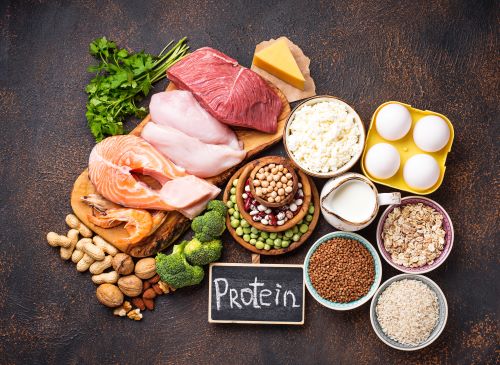The word protein has its root in the Greek word ‘proteios,’ which can be understood as something ‘primary.’ That is a clue enough to know how significant the need for protein in our bodies is. It’s one of the essential nutrients of our body, and our health gets impacted by our protein intake.
Twenty amino acids manage building protein. The amino acids in proteins come together and form long chains. Certainly then, the functions proteins serve for us are essential as well.
Growth and maintenance of the tissues are a part of the several vital functions. That is why those recovering from some sort of surgery or injury need higher amounts of protein. Athletes, too, have high requirements for protein. Another function revolves around the biochemical reactions caused by protein in our bodies. Enzymes (the proteins that help thousands of biochemical reactions take place) catalyze the crucial reactions required for your metabolism. Digestion, along with blood clotting, muscle contraction, and energy production are some important processes that rely on the aid of enzymes. Without these proteins, such critical reactions do not take place properly.
Proteins are also vital because they act as chemical messengers. The communication between cells, tissues, and organs takes place with the help of these proteins. Such proteins are called hormones and are secreted by endocrine glands. They can be grouped mainly into three groups – protein and peptides, steroids, and amines. Insulin and glucagon are two examples of proteins acting as messengers.
Many other functions make protein an essential part of your health. One of the essential services is the maintenance of fluid balance. Without enough protein intakes, your albumin and globulin levels will decrease. These are the proteins your body needs to maintain the fluid balance. As a result, they will no longer be able to keep blood in your blood vessels. This will lead to the fluid being forced into the spaces between your cells, which will cause swelling or edema in your stomach region.
Maintaining proper pH in your body, providing structure, and improving your immune health are crucial roles that protein plays. It’s unarguably one of the most important nutrients in your body.
How to calculate your protein requirements?
You need to consume enough protein every day, and your daily need will depend on various factors. Whether you’re male or female, how much you weigh the muscle you have –all of these are important considerations. Protein needs differ from individual to individual, just like calorie needs. Your body needs protein to maintain lean body mass, which is different from the fat-free mass. You should eat protein depending on how much lean mass you have. After having measured body composition, you can settle on the amount of protein you should take daily. It should be 0.5-1.0 grams of protein per pound of the lean body mass you have. If you do not have access to body composition analysis, you can estimate your daily protein needs according to how much you currently weigh. If you measure your body weight in pounds, you can multiply it by 0.7, this will not give you the perfect goal, but you’ll have a reasonable target for your protein intake in grams. Do the multiplication by 1.5 if you measure in kilograms.
Body composition
Since it is linked with many diseases like diabetes, cancers, and cardiovascular, body composition affects your long term health. There are many body composition analysis techniques, varying in their effectiveness. They’ll break down your body into its core components, like protein, body water, fat, and minerals.
Bioelectrical Impedance Analysis (BIA) is one such method. It measures your body fat concerning your lean body mass. A significant part of health and nutrition assessment, it’s a non-invasive test involving two electrodes.
Percent Body Fat is another indicator, which is more accurate than BMI. It tells you precisely how much fat makes up your body weight in totality. For females, the healthy body fat level is in the range of eighteen to twenty-eight percent, while it is ten to twenty percent for males.
Body composition analysis shows you the skeletal muscle mass in each body segment of yours. This can help you in building muscle. Along with your long term health, it’s also crucial for your strong immunity, good posture, and mobility.
Having a healthy body water balance is important for maintaining good health. The total body water you have can be divided into extracellular and intracellular water. Body composition analysis lets you keep track of any changes taking place in this balance.
A thing to remember is that being skinny is not equal to being healthy. Many people who look thin and healthy can also have health risks, just like an obese person. We assume they are healthy because they have fair amounts of subcutaneous fat. We remain unaware of how much visceral fat they carry. The risk goes up because BMI scales, which people usually rely on, do not detect the visceral fat.
Having fat and muscle balance is vital for staying healthy. Especially in old age, you will need sufficient nutrients to fight off illnesses.
Protein in foods
Ideally, it would be best if you depended on foods for your protein intake. Do not take protein shakes or powder unless you’re required to because of professional or medical circumstances. Going for plant-based protein foods can give you more fiber, so go for them more often. Legumes, beans, lentils, tofu, and other soy foods are excellent options. They also have low saturated fat, which is good for your heart. Nuts and seeds are delicious and healthy. You can have them with your yogurt, cereal, or salad.
Fish are an excellent food choice because they come with a lot of protein and omega-3 fats. More consumption of fish can decrease your risk of heart diseases. Try getting more salmon, sardines, herring, and mackerel. It’s also suitable for your weight.
Lean beef, lean chicken, lean pork, cheese, eggs, and low-fat yogurt are other high protein foods. If you’re working on losing weight, adding more smart carbs like fruits, vegetables, whole grains, low-fat milk, and beans can be great. Avocados, olives, seeds, virgin olive oil, and canola oil are other foods that will help you manage your appetite while reducing your calorie intake.
A high protein diet helps you in taming hunger pangs, which results in weight loss. So adding extra proteins to your meals is always a good idea. Increase the protein gradually. A weekly basis is good. Decide smartly while adding foods to your diet. Calories still count, so choose foods low in saturated fat and calories.





